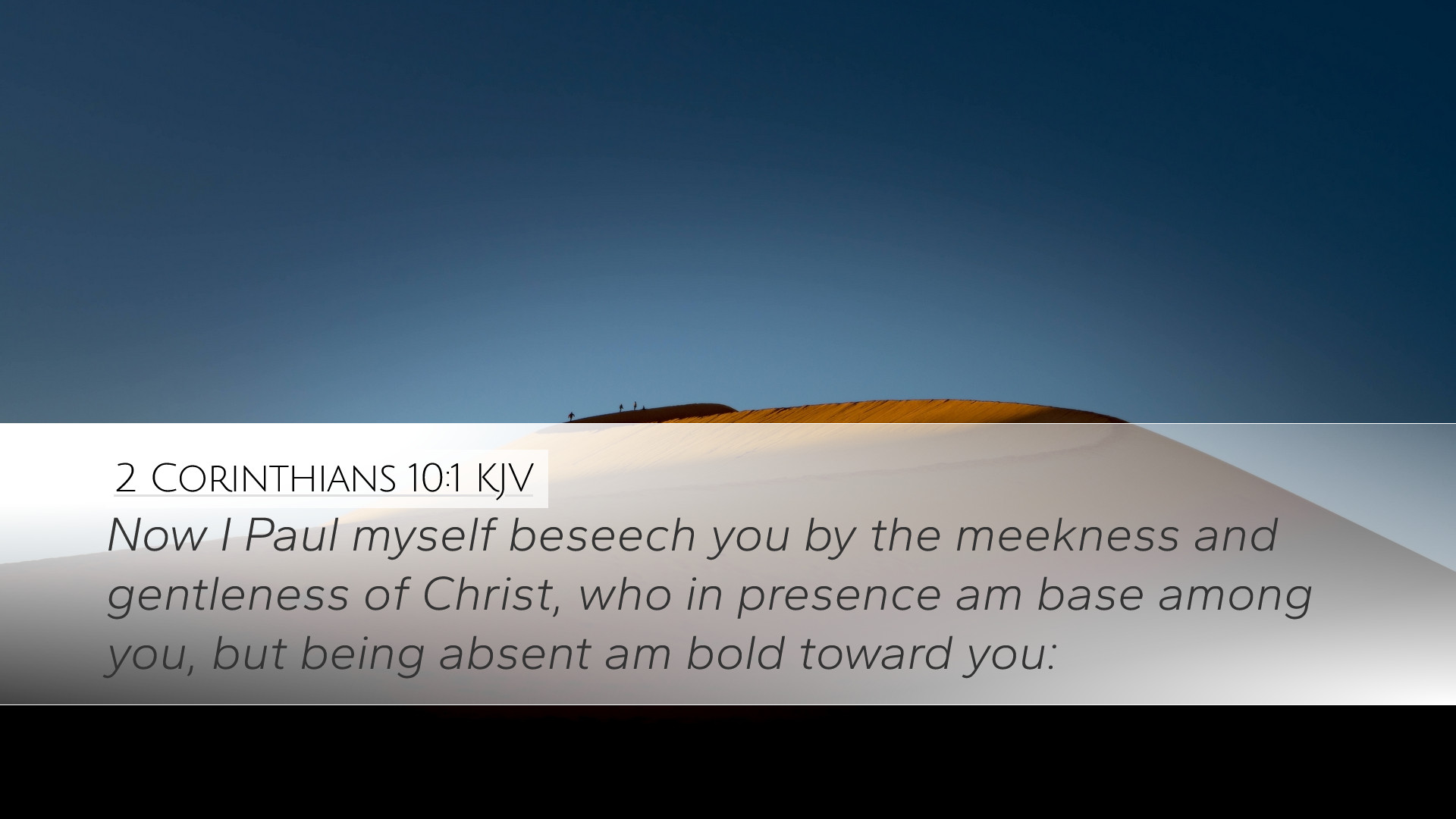Commentary on 2 Corinthians 10:1
"Now I, Paul, myself beseech you by the meekness and gentleness of Christ, who in presence am base among you, but being absent am bold toward you:" (2 Corinthians 10:1)
This verse serves as an introduction to Paul's heartfelt appeal to the Corinthian church. Paul, known for his profound theological insights and apostolic authority, employs the attributes of meekness and gentleness—qualities that exemplify Christ himself. This commentary seeks to provide a rich exploration of this verse through historical and theological lenses based on the insights of noted public domain commentators.
Understanding Paul's Appeal
In this verse, Paul shifts his tone from doctrinal instruction to direct pastoral challenge. He explicitly uses a personal appeal, indicating the seriousness of the situation in Corinth. The phrasing "I, Paul, myself beseech you" conveys his urgency and personal investment in the well-being of the church.
Meekness and Gentleness of Christ
Paul invokes the "meekness and gentleness of Christ," which demonstrates his desire to align his approach with the character of Jesus. Matthew Henry remarks on this, stating, “He speaks not as a man of authority in an austere manner, but as a humble entreator.” The apostle's avoidance of an authoritarian stance emphasizes his intention to win their hearts rather than impose his authority.
Theological Significance
Paul's invocation to Christ's attributes serves a dual purpose: it positions Christ as the ultimate model for behavior and establishes a paradigm for dealing with conflict within the church. Albert Barnes notes that “Meekness is not weakness; instead, it is strength under control.” This suggests that true spiritual authority often manifests through humility and gentleness rather than dominance.
Base in Presence, Bold in Absence
Paul also contrasts his "base" presence with his "boldness" in letters addressed to the church when he was absent. Adam Clarke interprets this to mean that Paul did not wish to be regarded with contempt due to his physical appearance or demeanor when present among them. “His absence gave him a certain freedom that was not as easily maintained in person,” Clarke elucidates.
Contextual Considerations
Understanding the cultural and ecclesiastical context of Corinth enriches the interpretation of this passage. The Corinthian church was embroiled in divisions, false teachings, and challenges to Paul's authority. This backdrop reveals the underlying tensions that prompted Paul to assert his apostolic rights while simultaneously cultivating humility.
Exhortations for Pastors and Church Leaders
This passage presents a significant teaching for pastors and church leaders who often face opposition or criticism. The call to exhibit meekness and gentleness may counter the authority challenges they face. As noted by Barnes, “Leaders should educate, guide, and correct with the spirit of Christ, embodying his meekness.” A pastoral approach that mirrors Christ's character can foster healthier church dynamics and encourage unity.
Implications for Theological Students and Scholars
The theological implications of 2 Corinthians 10:1 extend beyond mere academic analysis. It invites students and scholars to reflect on the nature of biblical leadership and Christ-like behavior. One should ponder how the attributes of meekness and gentleness can be integrated into contemporary theological practice and discourse.
Conclusion
In conclusion, 2 Corinthians 10:1 serves as a profound reminder of the nature of Christian leadership. The struggle between authority and humility, boldness and meekness, is a vital aspect of living out the gospel in community. By emulating Christ's example, leaders can engage their congregations in a way that is both authoritative and inviting, bold yet tender. This passage calls for introspection on how church leaders interact with their communities and the vital importance of embodying the character of Christ in all interactions.
Key Takeaways
- Leadership rooted in Christ's character: The meekness and gentleness demonstrated by Jesus must be central to Christian leadership.
- Authority balanced with humility: True authority in church contexts comes not from dominance but from humble service.
- Understanding context: Grasping the cultural and historical backdrop of biblical texts enriches the interpretation and application.
- Practical application: Pastoral care thrives when leaders embody Christ-like qualities, impacting the unity and health of the church.


